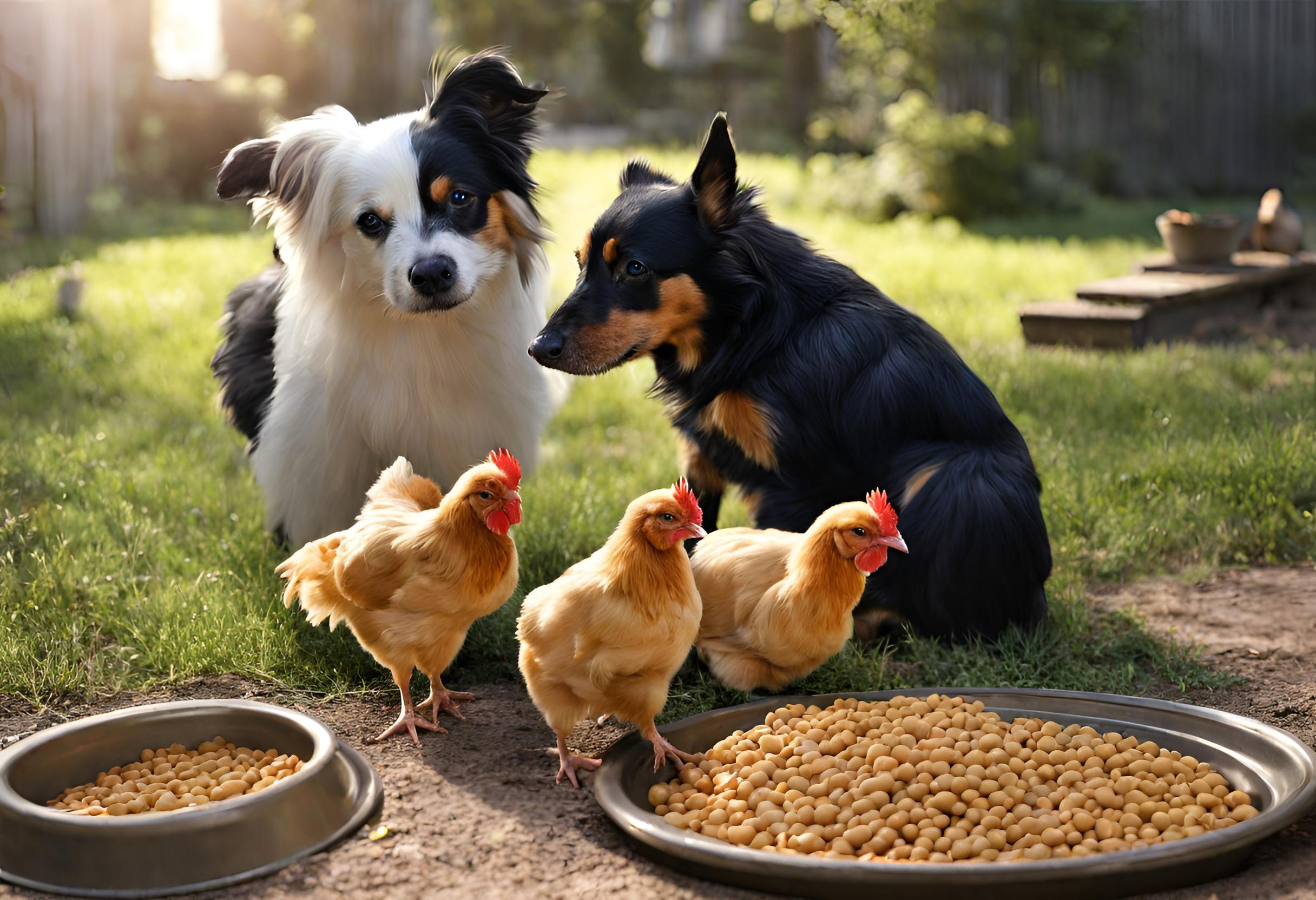Welcome to Eatdemy, your eating academy.
Raising chickens in our backyards has become quite a trend in recent years. For some, it’s a fun hobby, while for others, it’s about having a steady supply of fresh eggs. Whatever the reason, anyone who’s cared for these lively birds knows that their health and happiness largely depend on their diet.
Now, most of us know the basics of what chickens eat. They love their grains, seeds, and the occasional worm or insect they find while pecking around in the garden. But what if you run out of chicken feed? Or perhaps you’ve noticed that your chickens seem quite interested in your dog’s food. This might lead you to wonder, “Can chickens eat dog food?”
It’s an interesting question. After all, if dogs can eat it, why can’t chickens? But, as with all things related to animals and their diets, it’s not always that straightforward. Different animals have different dietary needs, and what works for one might not work for another. That’s why, before we dive into the main question, it’s essential to understand a bit more about our feathered friends and what they usually munch on.
Chickens, like all animals, require a balanced diet to stay healthy. Their primary food source is grains, which provide them with the energy they need to go about their day. Think of grains as the chicken version of our daily bread or rice. It’s their staple food. But grains alone aren’t enough. Chickens also need protein, which they usually get from insects, worms, and specific plants. Protein helps them build strong muscles and, for those hens laying eggs, ensures they can produce healthy ones.
Then there’s calcium, another essential part of a chicken’s diet. Why? Because calcium helps laying hens produce strong eggshells. Without enough calcium, the eggshells might be too thin, leading to broken eggs. Most chicken feeds have added calcium for this very reason. But chickens can also get calcium from other sources, like crushed eggshells or oyster shells.
Now, back to dog food. Dog food, especially the high-quality kind, is designed to be a complete diet for dogs. It’s got proteins, grains, and a bunch of other nutrients that dogs need. But dogs and chickens are very different animals. Just because a food is good for one doesn’t mean it’s suitable for the other.
So, before you decide to give your chickens a bowl of dog food, it’s worth taking a closer look at whether it’s a good idea. In the following sections, we’ll dive deeper into the composition of dog food, compare it with what chickens need, and hear from experts on the topic. By the end, you’ll have a clear idea of whether dog food is a yay or nay for your chickens.
TLDR: Can Chickens Eat Dog Food?
Chickens primarily thrive on grains, seeds, and occasional insects for protein. While dog food is formulated to be a complete diet for dogs, it’s not tailored to chickens’ specific needs. Though it might offer some proteins and nutrients, it lacks the essential fibers and specific nutrients that chickens require. Regularly feeding chickens dog food can lead to an imbalance in their diet. It’s best to stick to chicken-specific feeds and use dog food only in emergencies and in moderation. Always consult with a poultry expert if unsure.
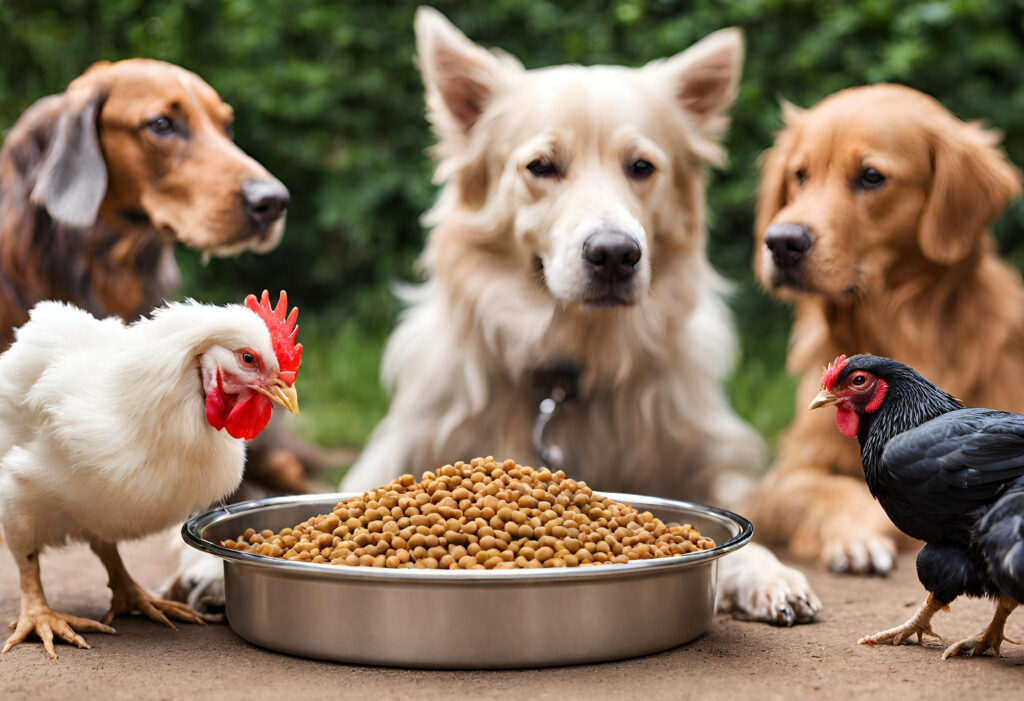
Composition of Typical Dog Food
Dogs are some of the most beloved pets around the world. Whether they’re tiny or massive, their diets are crafted to suit their diverse needs. But what exactly goes into the average dog food? Let’s take a look into this to see if it could ever be a fit for our chickens.
At its core, dog food is designed to be a one-stop meal for our canine companions. Remember, in the wild, a dog’s diet might consist of meats, some plants, and whatever else they can find. The goal of commercial dog food is to mimic this diverse diet to ensure that dogs get all the nutrients they need.
1. Main Ingredient: Proteins
Proteins are the building blocks of muscles. They’re essential for growth, repair, and overall health. Dog foods often have meat as the primary source of protein. This could be chicken, beef, lamb, or even fish. Some brands might also use meat by-products, which are parts of the animal that aren’t typically consumed by humans.
2. Carbohydrates for Energy
Just like we need carbs to give us energy throughout the day, dogs need them too. Dog food usually includes grains like rice, wheat, or corn. These ingredients provide dogs with the energy they need to run, play, and wag their tails all day long.
3. Fats for a Healthy Coat and Skin
Have you ever noticed how some dogs have shiny, glossy coats? Part of that comes from the fats in their diet. Dog food often contains oils, fats, and sometimes even omega fatty acids. These not only give energy but also support skin health and make those furry coats shine.
4. Vitamins and Minerals
Just like humans, dogs need a mix of vitamins and minerals to stay healthy. Calcium for strong bones, iron for healthy blood, and other essential nutrients are often added to dog food. These are crucial for various bodily functions and to prevent deficiencies.
5. Special Additives
Depending on the brand and type, some dog foods might have added extras like probiotics for digestion, glucosamine for joint health, or even herbs for various benefits.
Now, here’s the crucial part. While all these ingredients sound great for dogs, chickens have a different set of dietary needs. For instance, while dogs are omnivores (they eat both plants and meat), chickens are primarily herbivores, with their diet being plant-based. They do eat insects and worms, but their primary food source is grains.
Moreover, the balance of nutrients in dog food is tailored for canine health. The protein levels, while great for a dog’s muscle health, might be too high for chickens. Similarly, the type of grains and their ratios, the added minerals, and the fat content are all formulated with dogs in mind.
Another thing to consider is the shape and texture of the food. Dog food often comes in kibble form, which might be too large for chickens to peck at or consume comfortably. Though chickens are known for their ability to break down various food items with their strong gizzards, consistently large or hard kibble might not be ideal.
To get to the point, while dog food is a balanced dietary source for dogs, it’s not crafted for chickens. Its composition reflects the dietary needs of canines, not poultry. Before making any decisions about feeding dog food to chickens, it’s essential to understand these differences and prioritize what’s best for the chicken’s health and well-being. Let us next compare these needs more closely and seek expert opinions to give a clearer answer to our central question.
Nutritional Requirements of Chickens
Just like humans have their unique dietary needs, chickens do too. While they might seem content pecking around the yard, finding bits here and there, their nutritional needs are quite specific. Let’s explore what makes up a balanced diet for chickens.
1. Grains and Seeds: The Mainstay of a Chicken’s Diet
When you think of chickens feeding, the first image that likely comes to mind is them pecking at grains scattered on the ground. Grains, such as corn, wheat, and oats, are the primary energy source for chickens. They provide the carbs that keep chickens active and clucking.
2. Proteins for Growth and Egg Production
While grains are vital, proteins play a crucial role too, especially for young chicks and laying hens. Proteins help in muscle development, feather growth, and, importantly, in producing eggs. Chickens usually get their protein from bugs, worms, and other tiny creatures they find while foraging. In a more controlled environment, soybean meal is a common protein source in chicken feed.
3. Greens and Vegetables for Vitamins and Minerals
Chickens love pecking at greens. Whether it’s grass, lettuce, or other leafy greens, they provide essential vitamins and minerals. Think of this as the chicken version of eating their veggies. These greens also contain water, which helps in digestion.
4. Calcium for Strong Eggshells
Anyone who keeps laying hens knows the importance of calcium. Calcium ensures that the eggs have strong, healthy shells. Without adequate calcium, eggshells can become thin and brittle, leading to breakages. Oyster shells or crushed eggshells are common sources that keepers provide to their hens.
5. Grit for Digestion
While not a nutrient, grit is vital for a chicken’s digestive process. Chickens don’t have teeth. Instead, they swallow food whole, and it goes to their gizzard, a muscular part of their stomach. Here, with the help of grit, the food gets ground up for digestion.
6. Clean Water: A Daily Essential
Water isn’t just for ducks! Chickens need a constant supply of fresh, clean water. It aids in digestion, helps regulate body temperature, and is essential for laying hens to produce eggs.
Now, you might wonder, where does commercial chicken feed fit into all of this? Well, manufacturers design chicken feed to be a balanced diet, considering all these nutritional requirements. When you pick up a bag of chicken feed, it usually has a mix of grains, proteins, and added minerals and vitamins to ensure your chickens get everything they need.
So, with all these specific dietary requirements in mind, it becomes evident that any changes or supplements to a chicken’s diet should be considered carefully. While they might enjoy the occasional treat or new food source, their primary diet should always align with their unique nutritional needs. It ensures they remain healthy, produce eggs efficiently, and live a comfortable life.
Dog food, as discussed earlier, is tailored for a completely different species with entirely different nutritional priorities. While it might seem like a handy alternative or supplement, it’s essential to weigh it against what chickens genuinely need.
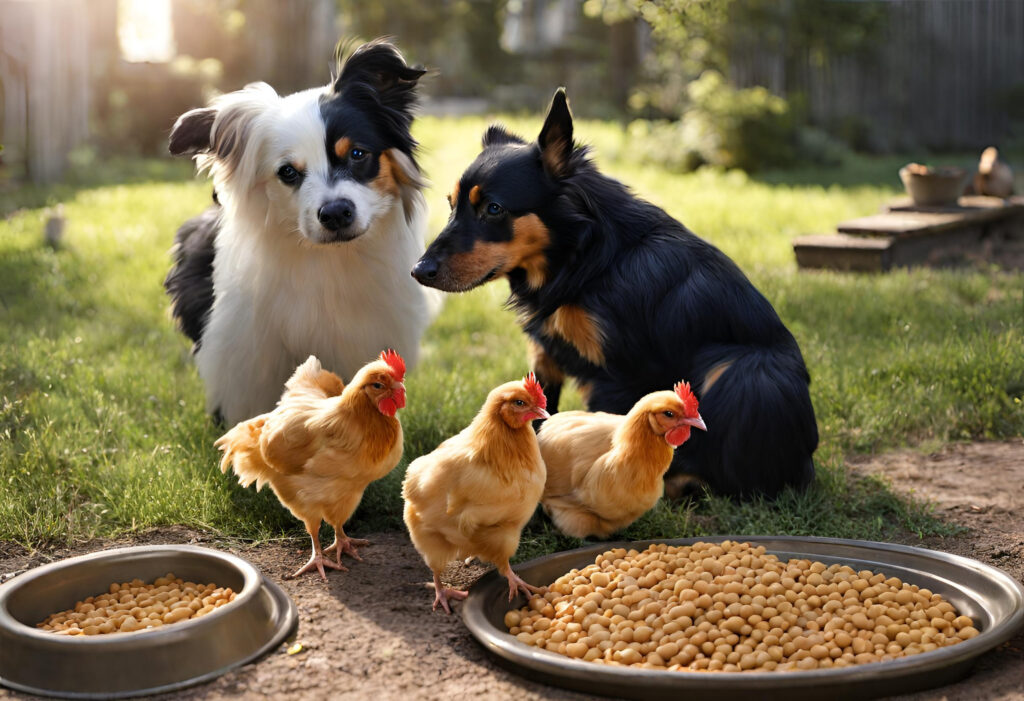
Potential Benefits of Feeding Dog Food to Chickens
So, you have a bag of dog food and a flock of chickens, and you’re wondering if the two can mix. While it’s clear that the primary diet of chickens and dogs are quite different, could there be any benefits to occasionally giving your chickens some dog food?
1. Protein Boost:
One of the immediate things that might come to mind is the protein content in dog food. Most dog foods, especially the high-quality ones, are rich in protein. For chickens, especially those in the growing phase or laying hens, a protein boost can be beneficial. It can aid in muscle development, feather growth, and consistent egg production.
2. Variety in Diet:
Chickens are naturally curious creatures. They enjoy pecking around and discovering new food sources. Offering them something different now and then, like dog food, can be an exciting treat. It introduces them to new textures and flavors, and we all know how much chickens love treats!
3. Emergency Feed:
Imagine running out of chicken feed and not being able to get a new bag immediately. In such situations, dog food can act as a temporary filler. It ensures that your chickens have something to eat until you can provide their regular feed.
4. Cost-Effective for Some:
For those who already have dogs and buy dog food in bulk, using it occasionally as a supplement for chickens might seem cost-effective. Instead of purchasing separate treats or supplements, some chicken owners might consider giving a handful of dog food to their flock now and then.
5. Beneficial Nutrients:
Apart from proteins, dog food contains various vitamins and minerals essential for canine health. While not all of these nutrients align with a chicken’s needs, some might be beneficial. For instance, dog foods with added Omega-3 fatty acids can promote shiny feathers, while certain vitamins can support overall health.
However, while these benefits sound promising, it’s crucial to remember that they come with a caveat. Dog food is not designed for chickens. Even if it offers certain advantages, they might be outweighed by potential risks. Using dog food as an occasional treat is one thing, but relying on it as a primary food source can lead to nutritional imbalances and other health issues for your chickens.
Another thing to consider is the type of dog food. There’s a vast difference between low-quality dog food filled with fillers and a high-quality, meat-first dog food. If you ever decide to give your chickens some dog food, always opt for the best quality. It ensures that your chickens get real meat protein instead of just fillers and artificial additives.
While there are potential benefits to feeding your chickens dog food, they should be weighed against the risks. Chickens have evolved over thousands of years to consume a specific diet. Any changes or additions to this diet, even beneficial ones, should be made carefully and always with the chicken’s best interest in mind.
Concerns and Risks of Feeding Dog Food to Chickens
While there might be some potential benefits to offering dog food to chickens, it’s equally essential to be aware of the possible downsides.
1. Nutritional Imbalance:
The primary concern with feeding dog food to chickens is the risk of nutritional imbalance. Chickens have specific dietary needs, with grains being their main food source. Dog food, being meat-centric, might provide more protein than chickens require. Over time, this can cause issues like kidney problems or other health complications related to excessive protein intake.
2. Lack of Essential Fibers:
Chickens need a good amount of fiber in their diet, mainly from grains and plants. Dog food doesn’t typically contain the kind of fiber that chickens need. A lack of fiber can disrupt a chicken’s digestive system, leading to problems like constipation or other digestive disorders.
3. Potential for Weight Gain:
The high fat content in some dog foods can lead to weight gain in chickens. While a plump chicken might seem healthy, excessive weight can cause several issues. For laying hens, being overweight can lead to reduced egg production or even health issues like fatty liver disease.
4. Choking Hazards:
The size and shape of dog food kibble might not be suitable for chickens. Larger kibble can pose a choking hazard. While chickens have a unique way of breaking down food in their gizzard, consistently offering them hard or large food particles can be problematic.
5. Harmful Ingredients:
Not all dog foods are created equal. Some might contain ingredients that are harmful or even toxic to chickens. Additives, preservatives, or certain artificial flavorings that are safe for dogs might not be for chickens. It’s essential to be aware of the ingredients list if you’re considering offering any dog food to your flock.
6. Over-reliance on Dog Food:
While dog food might be a handy alternative in emergencies, relying on it regularly can deprive chickens of the nutrients they get from their standard diet. Chickens need a varied diet, including grains, greens, bugs, and worms. Over-reliance on dog food can limit their intake of these essential food sources.
7. Behavioral Changes:
Chickens, when introduced to new food sources, might develop a preference, especially if they find it tasty. There’s a risk that chickens might favor dog food over their regular feed, leading to imbalanced nutrition. Additionally, introducing a new food can sometimes lead to competition or aggression among flock members.
8. Unknown Long-Term Effects:
The truth is, there hasn’t been extensive research on the long-term effects of feeding dog food to chickens. While short-term feeding might not show immediate adverse effects, we can’t be sure about the long-term implications.
While the idea of feeding dog food to chickens might seem convenient or even beneficial in some respects, the potential risks are hard to ignore. It’s always best to prioritize the natural and established dietary needs of animals. Chickens have thrived on a grain-based diet, supplemented with proteins from bugs and other sources, for a long time. Any deviation from this should be approached with caution and proper knowledge.
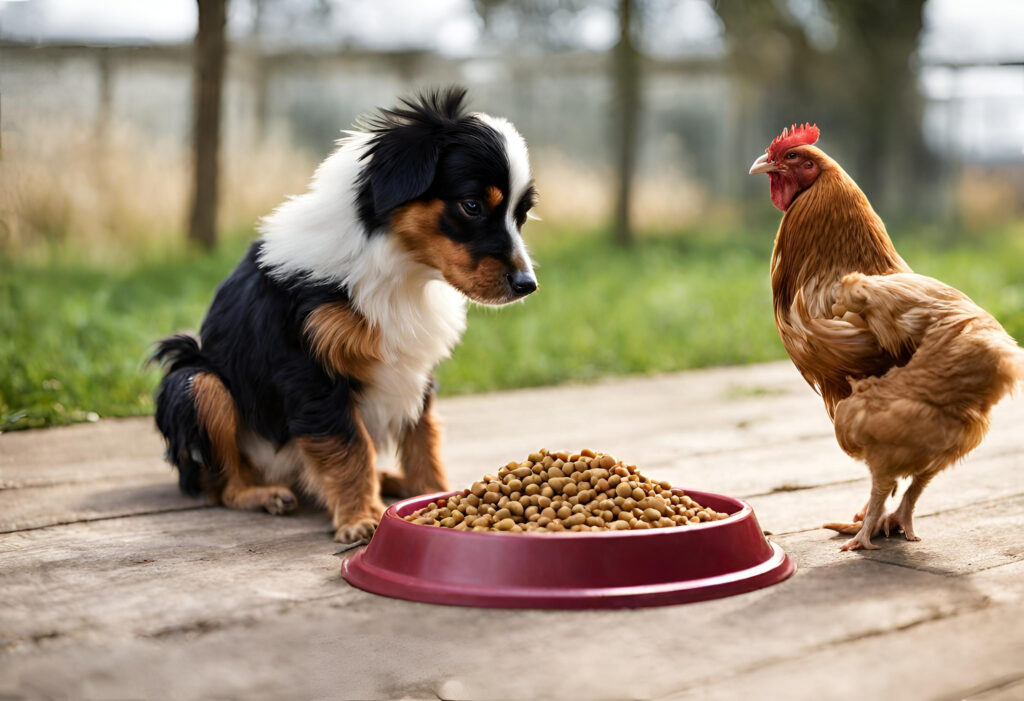
Comparing Dog Food to Standard Chicken Feed
If you’ve got dogs and chickens, you might have looked at their food and thought, “Aren’t they somewhat similar?” While on the surface, dog food and chicken feed might seem comparable, they are tailored for very different animals.
1. Purpose and Design:
At the start, it’s vital to understand the primary aim behind these foods. Dog food is formulated to cater to the dietary needs of dogs – omnivores with a strong lean towards meat. Chicken feed, on the other hand, is designed for birds that are mainly herbivorous but do consume small animals like insects. This fundamental difference sets the stage for how each food is crafted.
2. Protein Content:
Dog food often boasts a high protein content, deriving from meats like beef, chicken, or fish. The protein levels in dog food might range anywhere from 20% to 30%, or even higher in some brands. Chicken feed, while having protein, is balanced to fit a chicken’s needs. Layer feed, for instance, typically contains around 16% protein, sourced from plants and grains, and supplemented with some animal proteins.
3. Carbohydrates and Fibers:
Chickens get their energy mainly from grains, making carbohydrates a significant part of their diet. Chicken feed is rich in grains like corn, soybean, and wheat, providing the essential fibers and carbs chickens need. Dog food, while containing carbs, emphasizes more on proteins and fats, with grains often playing a secondary role.
4. Fats and Oils:
Dogs, being more active and having different metabolic rates, require a good amount of fats in their diet. Dog food often contains added oils or fats, contributing to a shiny coat and healthy skin for dogs. Chicken feed has fats, but in moderation, tailored to the energy requirements of poultry.
5. Vitamins and Minerals:
Both dog food and chicken feed are fortified with essential vitamins and minerals. However, the type and amount differ based on the specific needs of each animal. For example, laying chicken feed has added calcium for eggshell production, a nutrient that’s not as emphasized in dog food.
6. Shape and Size:
This might seem trivial, but the physical form of the food matters. Dog food kibble is designed for a dog’s mouth, often larger and harder. Chicken feed, whether in pellet form or as grains, is sized for easy pecking and consumption by birds.
7. Cost Implications:
On a practical note, dog food, especially high-quality brands, can be pricier than standard chicken feed. Using dog food as a regular feed for chickens might not be the most cost-effective choice for chicken owners.
8. Additives and Fillers:
Some dog foods, especially lower-quality ones, might contain fillers or additives that don’t offer much nutritional value. While this is a concern for dogs too, for chickens, these fillers might further dilute the nutritional content they’re getting.
While dog food and chicken feed might seem similar at a glance, they are distinct in composition, purpose, and nutritional value. Each is tailored to cater to the specific needs of its intended consumer.
Expert Insights: What Veterinarians and Poultry Specialists Say
When considering making changes to the diet of our pets or livestock, seeking expert advice is always a smart move. Veterinarians, animal nutritionists, and experienced poultry keepers possess a wealth of knowledge and experience. Let’s see what the experts have to say about the idea of feeding dog food to chickens.
1. Veterinarians Weigh In:
Most vets who specialize in poultry or avian health emphasize the importance of a balanced diet tailored to the specific needs of the bird. They often warn against making significant changes or introducing unfamiliar foods without proper knowledge. When it comes to dog food, while they acknowledge the high protein content, they also highlight potential imbalances. Excessive protein, certain additives, or the lack of essential nutrients found in chicken feed can lead to health complications.
2. Animal Nutritionists’ Views:
Nutritionists focus on the composition of food. They study what each animal requires for growth, production, and overall health. For chickens, their dietary needs are significantly different from dogs. Animal nutritionists would stress that while dog food might seem nutritionally rich, it doesn’t align with what chickens require. The balance of protein, carbs, fats, vitamins, and minerals in dog food is skewed towards canine needs.
3. Experienced Poultry Keepers:
People who’ve been keeping chickens for years often rely on tried and tested methods. Many of them might have experimented with various foods or supplements over the years. Their hands-on experience offers valuable insights. Most seasoned poultry keepers would advise against using dog food as a primary feed. They might, however, share instances where they’ve used it as a temporary solution or treat.
4. Possible Positive Feedback:
There might be some experts or experienced keepers who’ve had positive experiences with offering dog food to chickens occasionally. They might mention improved feather quality or increased activity levels in their flock. However, these instances are typically in controlled amounts and not as a primary food source.
5. Concerns Raised by Experts:
A common concern raised by experts revolves around the potential for nutrient imbalance. Chickens require certain nutrients in specific ratios for optimal health. Disrupting this balance can lead to various health issues, ranging from digestive problems to reduced egg production or even severe health conditions. The potential for overloading chickens with protein or fats from dog food is a genuine concern.
6. The Verdict:
While opinions might vary slightly, the overarching consensus among experts is clear: while it might be okay to give dog food to chickens occasionally and in moderation, it should never replace their primary diet. The risks involved in long-term feeding of dog food to chickens far outweigh any potential short-term benefits.
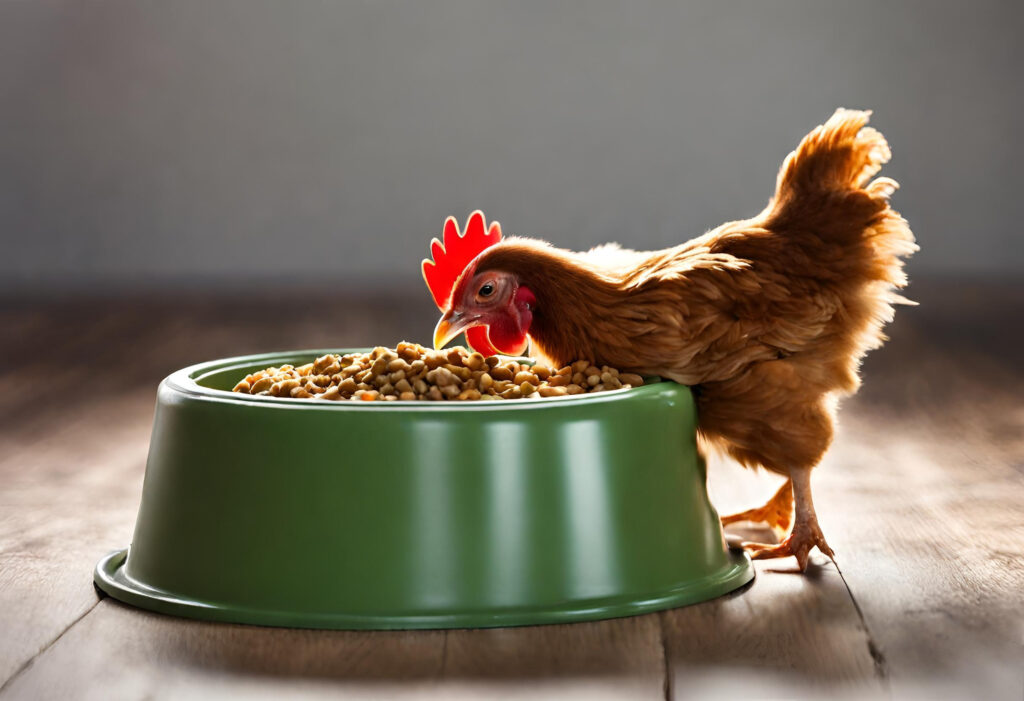
Safe Practices if You Choose to Proceed
So, you’ve considered the pros and cons and decided you might want to introduce dog food to your chickens occasionally. While it’s not the typical choice, if you’re set on proceeding, it’s essential to do so safely. Here’s a guide on how to offer dog food to your chickens and signs to watch out for, ensuring their well-being.
Tips for Introducing Dog Food to Chickens
1. Start Small:
Like with any new food, it’s always best to start with a small amount. This allows you to gauge your chickens’ interest and also monitor for any adverse reactions.
2. Opt for Quality:
If you’re giving dog food to your chickens, choose high-quality brands. These usually have better ingredients, fewer fillers, and more real meat. Avoid dog foods that have artificial additives or preservatives.
3. Wet the Dog Food:
Dry kibble might be hard for chickens to consume. Consider wetting the dog food to soften it. This makes it easier for chickens to peck at and can also reduce the risk of choking.
4. Mix with Regular Feed:
Instead of giving pure dog food, consider mixing it with their regular chicken feed. This ensures they’re still getting the essential nutrients from their primary food while trying out the dog food.
5. Limit Frequency:
Even if your chickens seem to love the dog food, it should remain an occasional treat. It shouldn’t replace their primary diet.
6. Clean Up Leftovers:
If you notice that the dog food isn’t entirely consumed within a few hours, clean it up. This prevents it from going bad and also keeps pests away.
Signs to Watch Out For
Even with the best precautions, it’s vital to stay vigilant and watch your chickens for any signs that dog food might not be suitable for them.
1. Digestive Upset:
One of the first signs that the dog food isn’t agreeing with your chickens could be changes in their droppings. If you notice diarrhea or unusually watery droppings, it might be best to stop offering dog food.
2. Reduced Appetite:
If your chickens seem less interested in their regular feed after introducing dog food, it could indicate a preference or even a digestive issue. Monitor their eating habits closely.
3. Changes in Egg Production:
For laying hens, any change in diet can potentially affect egg production. If you observe a sudden drop in the number of eggs or find the eggshells becoming thin or irregular, reconsider the addition of dog food.
4. Behavioral Changes:
Chickens are pretty expressive. If something is amiss, they’ll likely show it. Lethargy, reduced activity, or signs of distress might indicate that the dog food isn’t sitting well with them.
5. Physical Symptoms:
In extreme cases, an unsuitable diet can lead to physical symptoms. Feather loss, pale combs, or signs of weakness should be taken seriously.
6. Competition or Aggression:
Introducing a new food can sometimes lead to competition among the flock. If you observe increased aggression or fighting over the dog food, it might be best to remove it.
Alternative Treats and Supplements for Chickens
Chickens are naturally curious animals that enjoy exploring new foods. As chicken keepers, we love spoiling our flock with treats and supplements. But with the concerns surrounding feeding dog food to chickens, what are some safe and beneficial alternatives we can offer?
1. Fresh Vegetables:
Chickens love vegetables! Leafy greens like lettuce, spinach, and kale are a hit. They not only provide essential vitamins and minerals but also keep chickens entertained as they peck at them. You can hang a head of lettuce in their coop, and they’ll have a blast tearing it apart.
2. Fruits in Moderation:
Fruits like melons, berries, and apples (without seeds) are great treats. They’re packed with vitamins and are a refreshing snack, especially during warmer months. However, it’s essential to feed fruits in moderation due to their sugar content.
3. Grains and Seeds:
Offering a mix of grains like oats, barley, and quinoa can be both nutritious and entertaining for chickens. They’ll enjoy scratching and pecking at them. Sunflower seeds, in particular, are a favorite treat for many flocks.
4. Bugs and Worms:
Insects are a natural part of a chicken’s diet. Whether they’re foraging in the yard or you’re offering them dried mealworms, bugs provide essential protein. Plus, the act of hunting and pecking for these treats is a great way to keep chickens engaged.
5. Grit and Oyster Shells:
While not exactly a treat, grit is essential for digestion, and oyster shells provide the much-needed calcium for laying hens. If you have a laying flock, always ensure they have access to these.
6. Dairy Products:
Some keepers swear by offering occasional dairy treats like yogurt or cottage cheese. They can be a source of protein and calcium. However, ensure it’s in small amounts and not a regular part of their diet.
7. Cooked Foods:
Leftover rice, pasta, or even scrambled eggs can be offered occasionally. Chickens aren’t too fussy and will gladly peck at these. Just ensure that the food isn’t too salty or seasoned.
8. Commercial Treats:
Today, there are several commercial treats available for poultry. From seed blocks to mealworm cakes, there’s a wide variety to choose from. While they’re designed to be safe for chickens, always follow the recommended portion sizes.
9. Herbs:
Herbs aren’t just for flavor; they can be beneficial for chickens too. Herbs like mint, lavender, and basil can be a delightful treat and offer health benefits. For instance, garlic is known to boost immunity, and oregano can act as a natural antibiotic.
10. Homemade Treats:
If you’re feeling creative, there are tons of recipes online for homemade chicken treats. From seed-packed cookies to vegetable and grain mixes, you can whip up something special for your flock.
When offering treats, there are a few things to keep in mind. Always introduce new foods in small amounts and observe how your chickens react. Not all chickens might like or tolerate all treats. It’s also essential to remember that treats should supplement their primary diet, not replace it. A balanced chicken feed should still make up the majority of their intake.
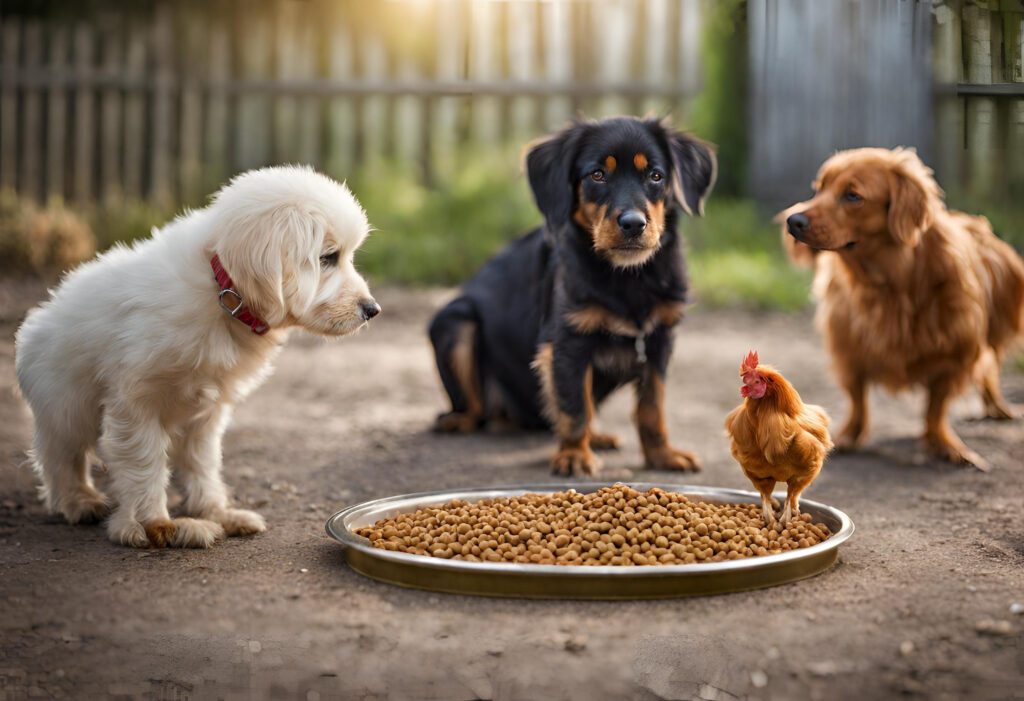
FAQ: Can Chickens Eat Dog Food?
1. Can chickens eat any type of dog food?
While chickens can technically eat dog food, it’s crucial to choose high-quality brands without artificial additives. The dog food should mainly consist of natural ingredients. However, it’s essential to remember that dog food should never replace their primary chicken feed but can be an occasional treat.
2. How often can I give my chickens dog food?
If you decide to offer dog food to your chickens, it should be infrequent. Think of it as an occasional treat rather than a regular part of their diet. Once a week in small amounts should be more than enough.
3. Will dog food improve my chickens’ egg production?
Dog food itself is not known to increase egg production. Chickens require a balanced diet, primarily consisting of their regular feed, to maintain consistent egg production. If you notice a change in egg production after introducing dog food, it’s essential to monitor it and possibly revert to their regular diet.
4. Is wet dog food better than dry kibble for chickens?
Wet dog food can be easier for chickens to consume as it’s softer. Dry kibble, especially larger pieces, might pose a choking hazard. If you’re offering dry dog food, consider wetting it a bit to soften it.
5. I’ve read that dog food can be a good protein boost for chickens. Is this true?
Dog food is typically higher in protein than regular chicken feed. While it can offer a protein boost, chickens don’t require excessive protein. If you’re looking for ways to increase their protein intake, there are safer alternatives like mealworms or other poultry-specific supplements.
Dear readers,
We’ve discussed at length the topic of feeding dog food to chickens in this article. While we’ve tried to cover all aspects based on research and expert opinions, real-life experiences from poultry keepers like you can provide invaluable insights.
Have you ever given dog food to your chickens? How did they react? Did you notice any changes in their behavior, health, or egg production? Your experiences, whether positive or negative, can be a guiding light for many others considering this dietary choice.
Moreover, if you have questions or if there’s something you believe we missed, please drop a comment. Community knowledge is often the richest, and by sharing, we all learn and grow.
We encourage an open, respectful, and constructive dialogue. Whether you’re a seasoned poultry keeper or someone just starting, every piece of knowledge and experience is valuable. Let’s create a community where we can share, learn, and support one another in providing the best care for our feathered friends.
Thank you for reading and being an active member of our community. We look forward to reading your comments and feedback!
Warm regards,
The Eatdemy Team


